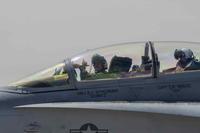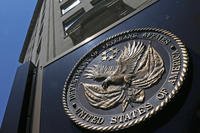The chairman of the House Appropriations defense subcommittee said this morning he will lean on the wary Democratic leadership to bring the defense spending bill to a full committee and then floor vote by the end of September.
The chairman was speaking at an awards event held by the Association of the US Army. Of course, House Speaker Nancy Pelosi may have tactical or strategic reasons to put the vote off, but we understand Dicks really wants to get this done.
Dicks, chairman for a few months since the death of Rep. Jack Murtha, is likely to run head on into Rep. David Obey, outgoing chairman of the full committee and a resolute opponent of war and -- sometimes -- defense spending. Obey actually announced his opposition yesterday to the war supplemental. In the end, Obey was swept away by the 308-114 vote for the supplemental, which included many Democrats. That may well have helped Dicks decide to push for a vote instead of waiting for party leadership and Obey to decide the bill's course.
Passage of a defense bill is seen by many lawmakers and by defense observers as a key measure of congressional effectiveness and as a commitment to troops serving in two wars and many conflicts. When defense spending is wrapped up in a continuing resolution, as has happened several times in recent years, it lessens congressional inputs on the administration's request since it usually means adopting the administration's budget request.
On the F-136 fight, Dicks opposed adding the second engine for the Joint Strike fighter to his bill after conversations held with Rahm Emmanuel, and Defense Secretrary Robert Gates. He believed their threats of a presidential veto. Many of his congressional colleagues -- most of whom have not sat down face to face with senior administration officials and taken their measure on this issue -- believe the Obama administration will not veto the defense bill over a relatively paltry sum and over a policy issue about which many senior defense lawmakers feel quite passionately.
The House version of the defense bill includes substantial, though unspecified, spending for the intelligence community. But Dicks, who has publicly discussed his interest in intelligence matters more often than did his predecessor, slapped some restrictions on the IC. His statement says that the spending bill includes "language that: prohibits new programs from being initiated without Congressional notification; prohibits contracting out of inherently governmental functions; curtails the growth of Senior Executive positions in the Office of the Director of National Intelligence; and prohibits use of foreign intelligence unless it has been lawfully collected."
For the list of other adds, see the earmark list and Dicks' statement.








